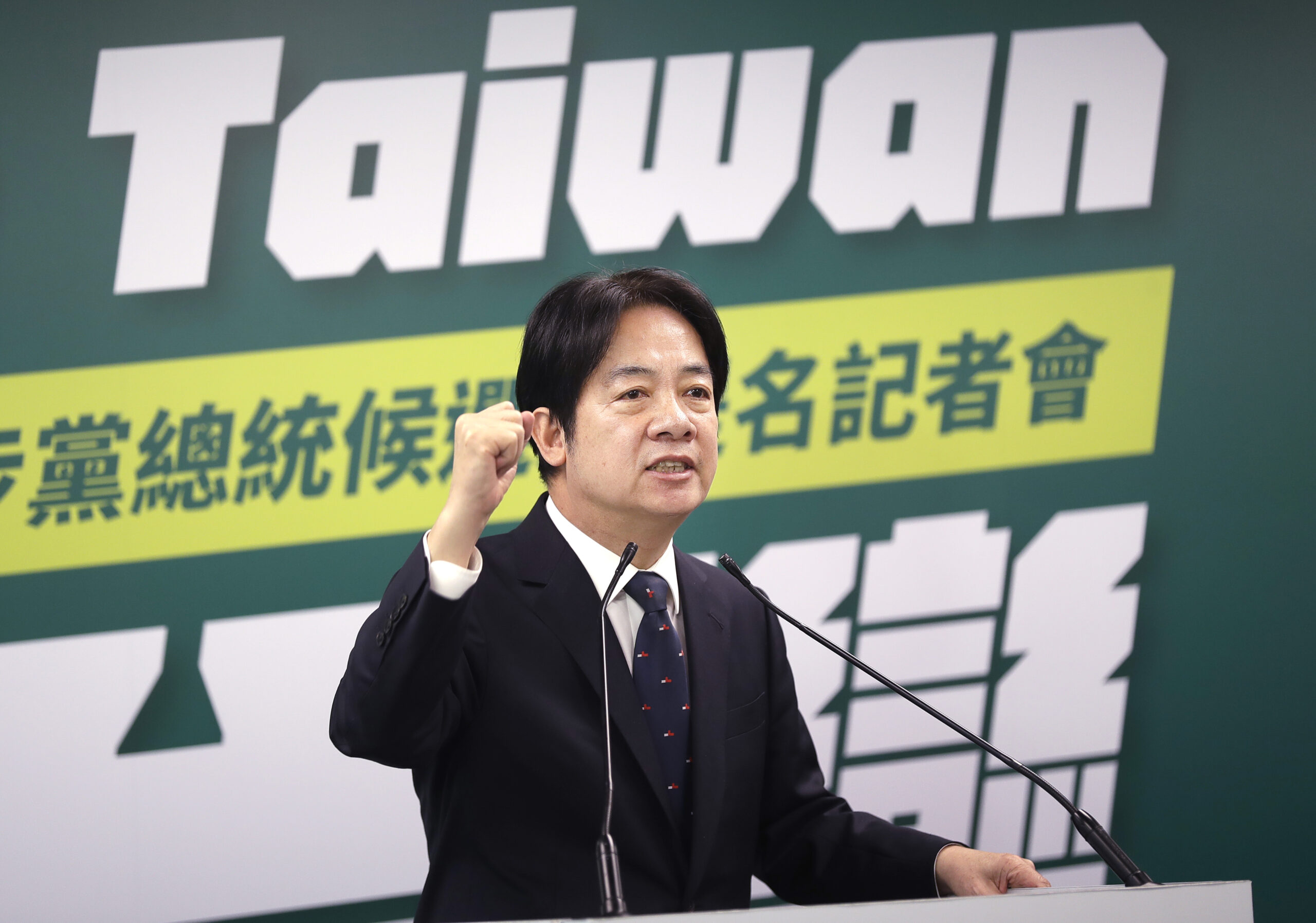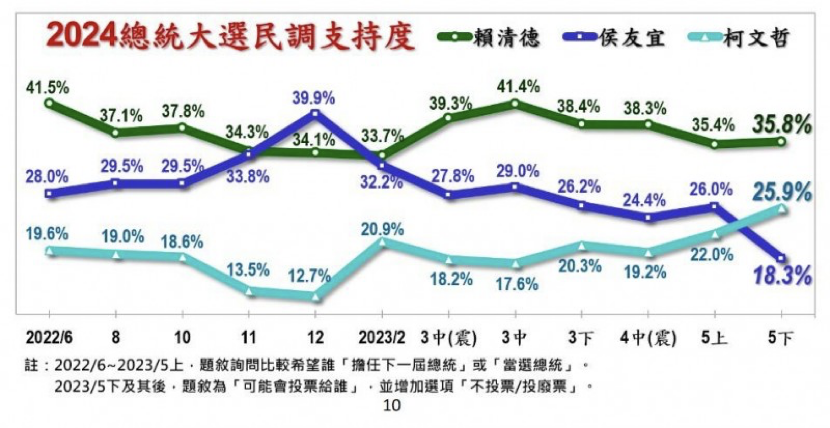
Taiwan’s largest opposition party, the Kuomintang (KMT), finally nominated the Mayor of New Taipei City, Hou You-yi(侯友宜), as its presidential candidate for the 2024 election on May 17. Another opposition party, the Taiwan People’s Party (TPP), announced that its chairman, Ko Wen-je(柯文哲), would also participate in the presidential election on May 20. The ruling Democratic Progressive Party (DPP) was the first to announce the candidacy of Vice President William Lai(賴清德) and established the “Friends of Trust” in various districts, emulating President Tsai Ing-wen’s “Friends of Xiao-Ing” to mobilize supporters to participate in local civil organizations.
The 2024 presidential election in Taiwan is expected to be a fiercely contested three-way race. The KMT, instead of nominating its own candidate, had Taiwan’s wealthiest businessman, Terry Gou, campaign on its behalf, claiming to represent the party. However, it is evident that Gou is not the preferred candidate in the eyes of KMT Chairman Eric Chu(朱立倫). Through various opaque selection mechanisms, Gou was excluded from the list of candidates.
Supporters of the opposition KMT are confident primarily because of the overwhelming victory the party achieved in the local elections two years ago. Similar to the script in the previous local elections four years ago, KMT supporters believe they have a chance to win back the presidency. However, the 2020 election results showed that the KMT’s Han Kuo-yu(韓國瑜) lost to President Tsai Ing-wen by a significant margin.
The KMT’s biggest crisis: Is losing to the emerging Taiwan People’s Party?
The KMT’s biggest crisis is not that Mayor Hou You-yi may lose to Vice President William Lai, but the possibility of losing to the emerging Taiwan People’s Party. According to the latest poll released by the My Formosa E-Newsletter on the 29th, William Lai’s support rate reached 35.8%, still holding the first place. It is noteworthy that Hou You-yi’s support rate dropped below 20% to just 18.3%, being surpassed by Ko Wen-je, who has a support rate of 25.9%. In the political survey conducted by My Formosa E-Newsletter on May 24-25, Mayor Hou You-yi’s presidential support rate was only 18.3%, significantly lagging behind William Lai’s 35.8% and Ko Wen-je’s 25.9%, experiencing a decrease of nearly 30%. This poses a significant political warning for Mayor Hou Youi-yi’s campaign.

美麗島電子報2024總統支持度最新民調。(取自謝曜州臉書)Source:<風傳媒> (The Storm Media),2023-05-29,https://www.storm.mg/article/4798624
The 2024 Taiwan presidential election will be a challenging and uncertain one. Mayor Hou You-yi, the KMT’s nominated candidate, did not gain widespread public support after his nomination, and instead, his support rate has gradually declined. This may be related to the fact that Mayor Hou You-yi failed to secure the position of KMT chairman. The KMT’s black-boxed-nomination of a candidate shows that they have failed to learn from past mistakes. A candidate chosen through internal party struggles may retain their original political position, but this is also seen by the public as lacking confidence in the election outcome and the courage to challenge the presidency.
In this election, each of the three candidates has their own individual characteristics and political baggage. William Lai has consistently advocated for Taiwan’s national consciousness in politics, but his unsuccessful challenge to President Tsai Ing-wen in the party primaries in 2020 was viewed as a betrayal by some of her supporters. Hou You-yi, as the Mayor of New Taipei City, presents a cautious and stable image, but his limited charisma and lack of party support have hindered his campaign. Ko Wen-je, the chairman of the Taiwan People’s Party, is seen as a dark horse in this race. As an independent candidate, he has gained popularity and recognition as the mayor of Taipei and has been able to appeal to a broad range of voters.
The Deadlock of Blue-White Cooperation
In such a situation, there seems to be a force in Taiwanese society trying to promote the so-called “Hou-Ko alliance” or “blue-white cooperation.” The purpose of this alliance is to achieve cooperation between the KMT candidate Hou You-yi and the Taiwan People’s Party candidate Ko Wen-je to increase their competitiveness against the ruling Democratic Progressive Party. However, promoting such an alliance is not easy and faces challenges and resistance. In the event that Mayor Hou You-yi’s poll numbers continue to decline, a crisis similar to the KMT’s “changing of the candidate” from Hung Hsiu-chu(洪秀柱) to Eric Chu(朱立倫) in the past may reoccur.
As an election observer, I believe that the deadlock of blue-white cooperation in the 2024 Taiwan presidential election is an important issue. The current KMT-nominated candidate Hou You-yi is facing difficulties in terms of public support and may lose to the Taiwan People’s Party’s Ko Wen-je. In such a situation, some people have proposed building a blue-white cooperation alliance to increase the opposition’s competitiveness against the ruling DPP.
However, achieving blue-white cooperation is not easy. Firstly, there may be conflicts of factions and interests within the KMT, which could make cooperation difficult. The KMT has experienced internal factional disputes in the past, which is not conducive to building effective cooperative relationships.
Secondly, there are political positions and policy differences between the Taiwan People’s Party and the KMT, which also present a challenge to blue-white cooperation. The two parties may have different priorities and orientations in their policies, and coordinating these differences and establishing consensus is crucial.
Furthermore, the roles and personal willingness of the candidates themselves are also key factors in blue-white cooperation. Whether the candidates are willing to set aside personal interests and release a portion of their votes to each other for the maximization of overall benefits is a question that needs to be considered.
Lastly, the perceptions and support of voters will also have an impact on blue-white cooperation. Whether voters are willing to accept such a cooperative alliance and how they evaluate and support the candidates will determine the feasibility and effectiveness of blue-white cooperation.
Considering these factors, the deadlock of blue-white cooperation is an important issue in the 2024 Taiwan presidential election. Overcoming this deadlock requires efforts and proper coordination from all parties involved. Consensus needs to be reached within the parties to resolve factional conflicts, and communication and negotiation between parties are necessary to establish.
The question now is whether the opposition parties, the KMT and the Taiwan People’s Party, can unite and form a strong alliance to challenge the ruling DPP. However, history has shown that the KMT and its splinter parties have often failed to cooperate effectively, leading to divided votes and ultimately benefiting the DPP. The dilemma of blue-white cooperation remains a significant challenge for Taiwan’s opposition parties.
Multiple factors of the 2024 presidential election in Taiwan
The 2024 presidential election in Taiwan will be a challenging and uncertain election. Voters will face several important considerations. Firstly, the policy positions and capabilities of the candidates. Voters will look at the candidates’ perspectives and solutions on national economy, social issues, international relations, and other matters. They hope to see candidates with effective leadership and implementation abilities to achieve the policy goals they have declared.
Secondly, the reputation and character of the candidates. Voters will consider the candidates’ personal backgrounds, political experience, and past performances. They want to elect a leader who is honest, upright, and possesses good moral qualities to represent their interests and values.
Another crucial consideration is the candidates’ election strategies and campaign teams. Voters will observe the candidates’ campaign activities, media performances, and public speeches, evaluating whether they have good communication skills and influence, as well as the ability to effectively organize and operate campaign teams.
Voters will also consider the political positions and policy tendencies of the candidates’ affiliated parties. They will pay attention to the parties’ stances on important issues represented by the candidates and assess if they align with their own values and political positions.
Party alliances and political forces, such as the Blue-White alliance. The formation of party alliances and the distribution of political forces among parties will also influence the election results. The formation of party alliances and the level of voter support for those alliances, as well as the coordination and cooperation among factions within parties, may all have a significant impact on the election outcome.
The influence of young voters on the election results is growing. It is important to pay attention to the young voters’ voter turnout, political perspectives, and use of social media. Social media plays a critical role in shaping voter perspectives and influencing voter behavior.
Lastly, voters will also be influenced by the surrounding environment and current affairs. Major domestic and international events, particularly China’s propaganda warfare and military threats against Taiwan, social issues, and economic conditions, can all potentially sway voters’ voting behavior at the last moment.
Overall, the 2024 presidential election in Taiwan is shaping up to be a highly competitive race, with each candidate facing their own challenges and obstacles. The outcome will have a significant impact on the political landscape of Taiwan and the future direction of the country.
The 2024 presidential election in Taiwan will be influenced by multiple factors, and voters will consider the candidates’ policy positions, capabilities, reputation, and character, as well as the political positions and election strategies of their affiliated parties. Ultimately, voters will elect the candidate they deem most suitable to serve as the President of Taiwan.
カテゴリー
最近の投稿
- 習近平の思惑_その3 「高市発言」を見せしめとして日本叩きを徹底し、台湾問題への介入を阻止する
- 習近平の思惑_その2 台湾への武器販売を躊躇するトランプ、相互関税違法判決で譲歩加速か
- 習近平の思惑_その1 「対高市エール投稿」により対中ディールで失点し、習近平に譲歩するトランプ
- 記憶に残る1月
- 高市圧勝、中国の反応とトランプの絶賛に潜む危機
- 戦わずに中国をいなす:米国の戦略転換と台湾の安全保障を巡るジレンマ
- トランプ「習近平との春節電話会談で蜜月演出」し、高市政権誕生にはエール 日本を対中ディールの材料に?
- A January to Remember
- Managing China Without War: The U.S. Strategic Turn and Taiwan’s Security Dilemma
- 「世界の真ん中で咲き誇る高市外交」今やいずこ? 世界が震撼する財政悪化震源地「サナエ・ショック」

